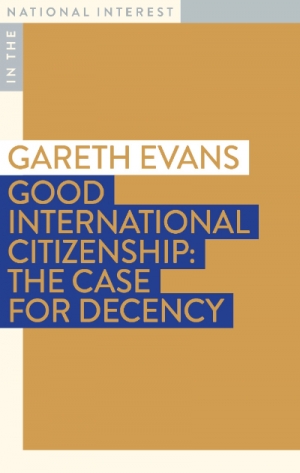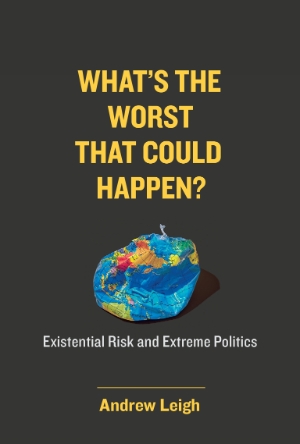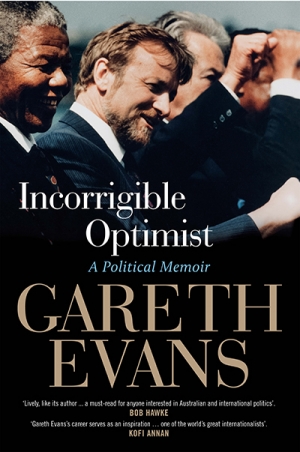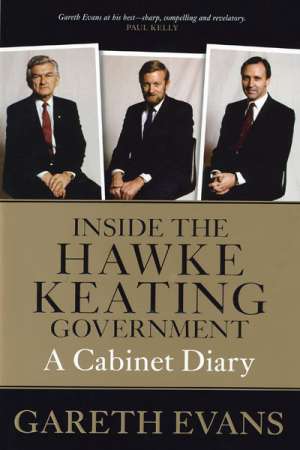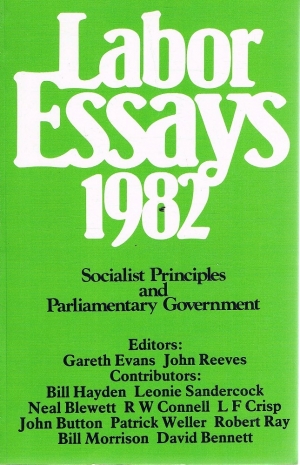Gareth Evans
Alison Broinowski reviews 'Good International Citizenship: The case for decency' by Gareth Evans
Over the course of a long and distinguished public life, Gareth Evans has held fast to his conviction that as individuals aspire to personal decency and moral behaviour, the same should be replicated among nations. As a foreign minister and an author, and in his international organisations and academic roles, Evans has consistently advocated ‘good international citizenship’. Care for our common humanity he sees as both a moral imperative and a national interest.
... (read more)Gareth Evans reviews 'What’s the Worst That Could Happen? Existential risk and extreme politics' by Andrew Leigh
Most people, and certainly most politicians, don’t spend much time or emotional energy thinking about whether human life on this planet will still exist in one hundred years’ time, or what efforts might need to be made right now if we and our descendants are to avoid extinction.
... (read more)James Walter reviews 'Incorrigible Optimist: A political memoir' by Gareth Evans
Gareth Evans is one of the more interesting figures from the Hawke–Keating governments, not alone as a high achiever in a talented team, nor in the tenacity that saw him remain so long in the inner circle, but unusual in forging a cosmopolitan career of such substance thereafter. His political memoir demonstrates the continuity ...
... (read more)David Day reviews 'Inside the Hawke–Keating Government' by Gareth Evans
Gough Whitlam was fond of replying to requests for interviews from historians by saying that all the answers could be found in the archives. ‘Go to the documents, comrade’, was his refrain. However, official documents rarely tell the whole story, particularly those from the modern era, whose authors are conscious that their words could so easily be exposed to public scrutiny. In particular, they are usually bereft of the innermost thoughts and motivations of the politicians and public servants. By contrast, politicians’ diaries can be goldmines. Written contemporaneously, an unguarded diary entry can transform our understanding of people and events.
... (read more)Dear Editor,
This is a note to congratulate you on the quality of the latest Calibre Prize essays, by Jane Goodall and Kevin Brophy, in the April edition of ABR. The two pieces maintain the incredibly high standards of the Prize, of which I was honoured to be an inaugural judge.
... (read more)It is hard to avoid the assessment that the most visible product to date of the war on terrorism has been nothing much more, or less, than more war and more terror. The unhappy reality since September 11 seems to be that all our major cities, and concentrations of Westerners anywhere, are as vulnerable as ever; the capacity of terrorist actors to do harm is as great as ever; their motivations are as great as ever; their identity is as elusive as ever; international cooperation is as fragile as ever; and international policy priorities are as misplaced as ever.
In Iraq, where the terrorist connection was the least plausible of all the reasons for going to war, terrorist violence has now become the most harrowing of all its consequences. The significance of Richard Clarke’s evidence to the September 11 Commission is not what the former anti-terrorism chief had to say, with all the wisdom that hindsight confers, about the failure of either Republican or Democrat administrations to take more effective action before September 11; rather, it is about the decision after September 11 to attack Iraq, a country that had about as much to do with it as Mexico, creating in the process the most expensive recruitment campaign for Islamist extremism ever launched.
... (read more)'September 11: A Symposium'
Sunday, 01 September 2002Never far from one’s mind these days, the events of September 11, 2001, and their direct aftermath in Afghanistan and elsewhere, had to be prominent in this month’s issue of ABR, such is their complex resonance and ubiquitous iconography. To complement Morag Fraser’s essay in this issue on the consequences of ‘September 11’ for civic ...
Peter Kerr reviews 'Labor Essays 1982: Socialist principles and parliamentary government published on behalf of the Australian Labor Party' edited by Gareth Evans and John Reeves
Times are changing within the Labor party. As L.F. Crisp points out in his essay on the branches, the new membership is often educated middle class and keen to discuss the International Situation where once the thing was to have a few beers and raffle a chook. Even Bill Hayden, despite his cop background, reflects some of the new flavour of the party with his too often carping manner, redolent of the classroom pedant. That Labor Essays – ‘designed to stimulate creative thought within and without the party’ – should have begun to appear in 1980 seems not unrelated to the growing desire within the party for intellectual as well as emotional satisfaction.
... (read more)
